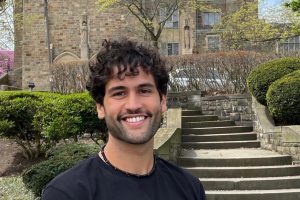
Khaled Aboumerhi, a doctoral candidate in the Department of Electrical and Computer Engineering (ECE), was boarding a four-hour flight from Baltimore to Colorado Springs when he got an important message on his cellphone: the status of his application for a Fulbright scholarship had changed.
Unfortunately, for Aboumerhi, the flight attendant had just instructed passengers “to put their devices away,” meaning he was in for a long trip.
“I sat in agony for the whole flight until my phone barely received signal, after which I was able to check and see that I had been accepted. The feeling was completely surreal and worth the long wait,” Aboumerhi said. “I submitted my proposal and application packet last October and we were told we wouldn’t hear back until May. I guess I’m one of the lucky ones who heard back early.”
The country’s largest educational exchange program, the Fulbright U.S. Student Program offers opportunities for students and professionals to live, work with, and learn from others in host countries. It awards about 2,000 grants annually and operates in 140 countries.
With support from his Fulbright Open Study/Research Award, Aboumerhi will attend ETH Zürich (Switzerland) and work in its Institute of Neuroinformatics as part of Giacomo Indiveri’s Neuromorphic Cognitive Systems group from September 2021 to September 2022. His research focuses on neuromorphic engineering, an interdisciplinary field that brings together engineering, computer science, biology, physics, and mathematics to design models of neural and sensory systems.
At Hopkins, Aboumerhi is a member of the Computational Sensory Motor Systems Lab (CSMS Lab) led by ECE Professor Ralph Etienne-Cummings.
“This Fulbright award provides an excellent opportunity for Khaled. Indiveri is a close colleague and friend of mine in Switzerland who works on complementary questions as the CSMS Lab. This will allow us to answer questions that we would not be able to ask on our own,” Etienne-Cummings said. “I am very proud of Khaled, and also looking forward to highlight and transfer JHU’s culture to the Swiss lab.”
Aboumerhi’s research is aimed at understanding human memory. In Zurich, he will use novel memory-holding devices to replicate lifelong learning (the human minds’ ability to sort between trivial and nontrivial information for a long time) onto a chip.
“Neuromorphic engineering exploits the brain’s tendencies while performing at nearly 1000-fold the efficiency of a standard computer,” Aboumerhi said. “In an ideal scenario, if every standard computer were successfully replaced by a neuromorphic computer, we would help usher the world in the right direction toward energy conservation.”
Aboumerhi is excited to travel to Switzerland, especially after spending more than a year quarantining due to the global pandemic. An avid practitioner, student, and fan of classical music, he hopes to hold a few concerts or short seminars playing the oud (a stringed instrument similar to a lute) or violin while speaking on the difference between western and Middle Eastern music. He is also learning German, and hopes to be able to speak a basic version of it by the time he gets to Zurich.
More than anything, though, Aboumerhi is looking forward to the opportunity to expand his research.
“I have always said that engineering has three major components: to understand, to innovate, and to communicate,” Aboumerhi said. “Working with scientists and engineers internationally at the European epicenter of neuromorphic engineering will undoubtedly help me with all three of these components.”